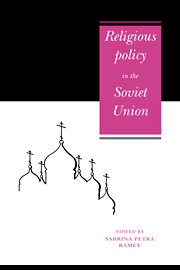Book contents
- Frontmatter
- Contents
- Notes on contributors
- Preface
- Part I Introduction
- Part II Policy apparatus
- Part III Education, socialisation, and values
- Part IV Cults and sects
- Part V The world of Christianity
- 12 The Russian Orthodox Renovationist Movement and its Russian historiography during the Soviet period
- 13 The re-emergence of the Ukrainian (Greek) Catholic Church in the USSR
- 14 Protestantism in the USSR
- 15 Epilogue: religion after the collapse
- APPENDIX: Religious groups numbering 2,000 or more, in the USSR
- Index
12 - The Russian Orthodox Renovationist Movement and its Russian historiography during the Soviet period
Published online by Cambridge University Press: 03 December 2009
- Frontmatter
- Contents
- Notes on contributors
- Preface
- Part I Introduction
- Part II Policy apparatus
- Part III Education, socialisation, and values
- Part IV Cults and sects
- Part V The world of Christianity
- 12 The Russian Orthodox Renovationist Movement and its Russian historiography during the Soviet period
- 13 The re-emergence of the Ukrainian (Greek) Catholic Church in the USSR
- 14 Protestantism in the USSR
- 15 Epilogue: religion after the collapse
- APPENDIX: Religious groups numbering 2,000 or more, in the USSR
- Index
Summary
The renovationist schism was founded on 12 May 1922, at the time of the arrest of Patriarch Tikhon when, in Moscow in the Troitsk parsonage, he signed an order for the transfer of church authority to Metropolitan Yaroslav Agafangel and for the formation in Moscow of the Supreme Church Administration, headed by Bishops Leonid and Antonin.
However, a few years before this there had begun in various places in Russia the formation of renovationist groupings which found their expression in literature. So, even as early as 1918 in Penza, there was founded a group of opposition clergy led by the local archbishop, Vladimir Putyat, who had been deprived of office by Patriarch Tikhon for sins against the Seventh Commandment (adultery). Under the banner of a renovated church, he raised a revolt against the Patriarch, a revolt known as the Vladimirshchina. The schism dried up before 1925. Its characteristic history of drunkenness was detailed in an unpublished manuscript by Master of Theology Nikolai Pavlovich Ivanov, Raskol arkhiepiskop Vladimira – Vladimirshchina (The Schism of Archbishop Vladimir – Vladimirshchina). This work was written in 1956 in Moscow. It was circulated among church people, and was known to His Holiness Patriarch Aleksii and Metropolitan Nikolai.
Far more important was the so-called Lebedyan incident, also reflected in the literature. The chief initiator of this incident appears to have been a priest, Father Konstantin Smirnov. An educated, well-read man who left his aristocratic family, Father Konstantin produced a series of decisive reforms in holy services. Shortly thereafter, like the local church authorities, Patriarch Tikhon forbade him from performing priestly duties.
- Type
- Chapter
- Information
- Religious Policy in the Soviet Union , pp. 273 - 291Publisher: Cambridge University PressPrint publication year: 1992



